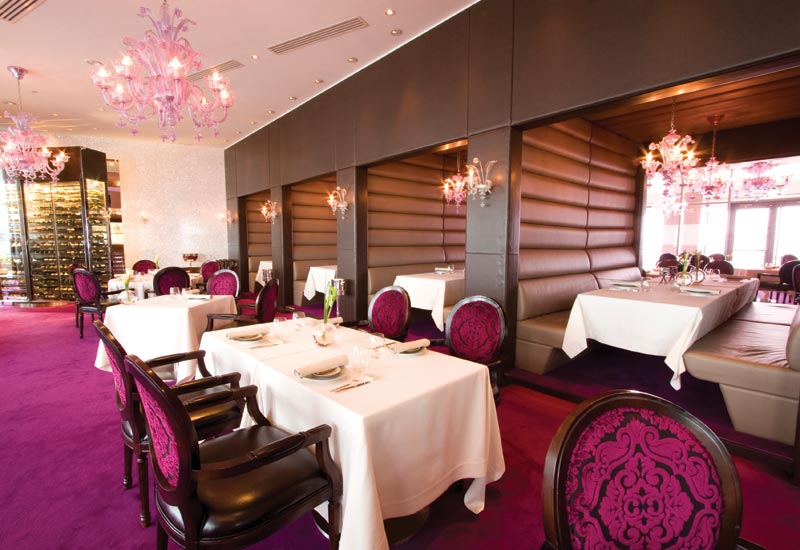 The elegant interiors of Reflets par Pierre Gagnaire, located in InterContinental Dubai Festival City.
The elegant interiors of Reflets par Pierre Gagnaire, located in InterContinental Dubai Festival City.
Pushing standards
Over in Dubai, however, it’s a different story. French cuisine is proving so popular that three-star Michelin chef Yannick Alléno opened his restaurant STAY last year, showcasing traditional cooking methods reinterpreted in a contemporary fashion.
The restaurant, which serves risotto to guests in a hollowed parmesan, and traditional dishes like degustation of lamb, joins Reflets par Pierre Gagnaire in raising the bar of high-end French cuisine.
Traiteur restaurant at Park Hyatt Dubai has followed the trend of the rise in popularity of French food and in 2009 rebranded from a restaurant that served modern European cuisine to specifically French cuisine.

| Advertisement |
Since then it has won numerous awards, especially for its revamped brunch, which now mainly consists of live cooking stations.
Executive chef Michael Clinton believes classic French dishes cooked in a traditional style will never fail, but does admit that food fusion is a great way of showcasing different ingredients. “Using fragrant ingredients like lavender as the start of a basic dish is something that is very en vogue,” he says.
At Traiteur he doesn’t have problems sourcing ingredients and cites Fresh Express and Classic Fine Foods as the best suppliers for top-line French products.
Frederique Simon, business development manager for supplier Chef Middle East, admits 25% of the company’s portfolio is made up of French produce.
“French cuisine is about quality,” she says. “But it is also expensive. However, all the restaurants in the UAE have made an effort to introduce an affordable menu so that people can sample the high-end cuisine.”
The restaurants realise that expense cannot be spared when buying French produce, as Alexander Stephan admits.
“We don’t base our profitability on percentage of food cost – that would be a great mistake. Conventional hotels and restaurants can run their food costs on 25-30%, but when you are running a five-star operation your food cost can go to 40%, 50% or 60%.
“Profitability should be coming from the number of times our guests come back.”
Home of the luxury brand
Marion Morand, senior account manager for Sopexa, in charge of organising Apéritif à la Française – an annual Dubai event held designed to promote French food and culture, agrees.
“French cuisine has a very positive image generally in the GCC, but sometimes can be perceived as complicated and expensive or out of reach. Basic French cuisine is simple, delicious and healthy,” she says.
Habib Bahri, Middle East brand manager for Evian knows French brands do well here because of the quality of the products.
“There are a wide variety of products linked to France’s natural resources and rich gastronomic heritage,” he explains.
“In the specific example of water, Evian and Badoit are both natural mineral waters that emerge with a unique and balanced mineral composition and that is from natural filtration through the French Alps for Evian, or Southern Loire region for Badoit.
“These products are also brands that are constantly innovating to meet customers’ needs in packaging, innovation or services.”
The French franchise
Given all of the above, lower-end restaurants such as Paul bakery and restaurant and Pascal Tepper are also thriving in the GCC.
This year, Paul has announced expansion plans in new markets Saudi Arabia, Turkey and Oman, as well as five new outlets opening in Abu Dhabi, Qatar and Cairo.
Pascal Tepper is also eyeing 20 outlets in the next three years.
Managing director of Atlas Hospitality, Siegfried Nierhaus, reveals: “We have growing demand in the Middle East for the Pascal Tepper French bakery franchise concept which we will soon be launching.”
But why are these bakery concepts so successful? Christian Salloum, brand manager for the Middle East, says it is the convenience of the concept that is one winning factor.
“Paul is a concept where you can dine all day long with the variety of food and drink. Desserts have a good market share across the region. Moreover it’s the careful selection process of our locations.”








 Search our database of more than 2,700 industry companies
Search our database of more than 2,700 industry companies









